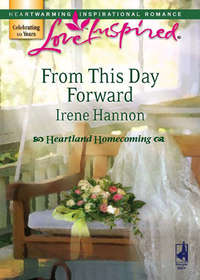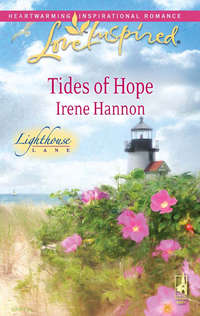
Полная версия
Crossroads
“I hope you won’t take offense if I say that you look especially nice today,” he said as he sat across from her, intrigued by her becoming blush—a reaction more typical of a schoolgirl than a once-married woman.
The husky quality in his voice did odd things to her stomach. “No, not at all,” she replied a bit breathlessly.
He leaned back and propped an ankle on his knee. “Okay. Where do we start? I’m new at this, so you’re going to have to walk me through it step by step.”
Tess smiled and reached for her notebook. She might not be comfortable in the role of desirable woman, but she was quite comfortable in the role of reporter. “I like to think of an interview as simply a conversation. Except I get to ask most of the questions. Why don’t we start with the award? Tell me what led to it.”
He did so easily, talking about the innovative intervention programs and one-on-one involvement he encouraged between students, parents, administration and teachers. Under Tess’s astute questioning, he revealed his passionate commitment to the kids, his concern about societal pressures on teens and on the American family, and the satisfaction he found in his work.
“I’m impressed, Mr. Jackson,” she said honestly. “The world could use more people who care so deeply. And I’m also curious. I understand that you were once a police officer—in Chicago, I believe. This is quite a career switch. What prompted you to make the change?”
Tess sensed his sudden, almost imperceptible withdrawal.
“I saw a lot on the street,” he said carefully, his words slower and more guarded. “Almost always too late for prevention. I wanted to find a way to intervene earlier. This kind of work seemed to offer that opportunity.”
Tess’s job had taught her to be attuned to nuances, and there were plenty here. There was something very important that he wasn’t revealing, and she was both curious and intrigued. But pushing usually just made a wary subject back off more. And she didn’t really need to go any deeper for this interview. So, regretfully, she moved on. “What brought you to St. Louis?”
She could sense his slight easing of tension. “My uncle. He has a farm about an hour south of St. Louis, and a little over two years ago he had a bad fall that left him with a limp. I came that summer to help, and when it was obvious that he’d need ongoing assistance with the farm, I got a job here.”
“You must have been there this weekend,” she said with a smile.
He looked at her in surprise. “How did you know?”
“Your tan. When I saw you Thursday, your face didn’t have nearly as much color.”
He grinned. “Your powers of observation are admirable, Ms. Lockwood. You’re right. We worked in the fields this weekend. I spend most of my free time there, especially in the nice weather.”
“Any other family locally?”
“No.”
“How about back in Chicago?”
An intense flash of pain ricocheted across his eyes. “No. My parents are both gone and my…my wife died seven years ago.”
Mitch frowned. He hadn’t meant to say that. Hadn’t intended to reveal anything about Dana. Wasn’t sure why he had.
“I’m so sorry,” Tess said softly, taken aback by that fleeting glimpse of anguish. “I had no idea….” Her voice faltered. She’d wondered about a wife, found it difficult to believe someone like Mitch would have remained single all these years, had speculated there might be a divorce in his past. But she hadn’t expected this. “I didn’t mean to bring up painful memories,” she apologized.
He took a deep breath. “It’s okay.” And surprisingly, it was. It didn’t hurt nearly as much to talk about it as he’d expected. “It was cancer. It hit out of the blue and, mercifully, took her quickly. But it was still a terrible thing to watch. For a long time afterward I was…lost.” For a lot of reasons, he thought, his gut twisting.
“I can understand that,” Tess empathized. “I went through something similar with my father five years ago.” She paused and took a deep breath. “It’s awful to watch someone you love slip away.”
“Yes, it is. But it helps to have a support system. I had my mother and Uncle Ray. How about you?”
“I had Bruce. And my faith, which was a great comfort.”
“What about Bruce’s father?”
Tess looked at him in surprise. She almost brushed aside the question, but for some reason decided to answer it. “We divorced six years ago.”
His gaze softened in sympathy. “I’m sorry, Tess. Divorce can sometimes be as painful as death.”
“More so, in some ways,” she said sadly. “And don’t be sorry. The divorce was long overdue.” She tilted her head and forced herself to smile. “Now, how did things get turned around? I thought we were talking about you?”
He grinned. “You already know the story of my life.”
Hardly, she thought. The man across from her had secrets, which he clearly didn’t intend to reveal, she realized. Besides, she had plenty of material for her story. It was time to wrap things up.
Tess smiled and closed her notebook. “Well, at least enough for my story,” she amended.
“You know, this wasn’t nearly as bad as I expected,” Mitch admitted as they both rose and walked toward the door.
“I’m glad to hear it.” She paused on the threshold and turned to hold out her hand. “And thank you. My editor will be very pleased.”
He smiled as he took her hand in a firm grip. “I hope your readers will feel the same way. I’m afraid they might be bored by the story of a dull school principal.”
At first Tess thought he was kidding, but as they said their goodbyes she realized he was dead serious. Dull? she thought incredulously. Mitch Jackson? No way. Intriguing would be a more apt description, she decided as she walked down the hall. She’d thought that by the end of the interview she’d know all the important things about the principal. But she had a feeling that she’d barely scratched the surface of this fascinating man. Instead of satisfying her curiosity, today’s interview had made her want to find out more.
Unfortunately, there wouldn’t be much opportunity for that, she admitted with a pang of regret. Any future contact with the principal would be related to Bruce. Because to Mitch, she was just another mother dealing with a problem child.
Except at the end of the interview he had called her “Tess,” she realized suddenly, stopping abruptly. That was a good sign. Wasn’t it? Didn’t it mean he thought of her as a person in her own right, not just as a mother?
Tess wasn’t sure. Wasn’t even sure if she wanted him to think of her that way. It was too scary. And complicated. And probably unwise.
She knew all that intellectually. And accepted it.
But for some reason, her heart just wasn’t listening.
“So how was your day?”
“Okay.”
Tess sighed. So far the new dinner-hour-together rule hadn’t spurred the conversation and sharing she’d hoped for with Bruce. It was the old “You can lead a horse to water…” scenario. And Bruce wasn’t drinking. But she wasn’t going to give up.
“Did you look into the art club?” she asked, trying again. Chris Stevens had run through a list of supervised after-school activities at the meeting, and Tess had suggested the club to Bruce, who’d always shown strong artistic aptitude and interest.
“They’re a bunch of geeks.”
“How do you know?”
At his disgusted look, she let it drop.
They ate in silence for a few moments before she worked up the courage to introduce a new subject. “Guess who I interviewed today?” she asked, her tone a little too bright. When he didn’t respond, she plunged in. “Mr. Jackson.”
That got his attention. “Why?”
“He just received the governor’s award for excellence in education.”
“You’re kidding!”
“No. He’s doing good work at the high school.”
Bruce gave a disdainful snort. “Right.”
“So you don’t think he’s a good principal?”
Bruce shrugged. “He’s too ‘in-your-face.’”
“Meaning?”
“He’s always hanging around with the kids. And watching what we’re doing. I thought principals were supposed to stay in their office and run the school.”
“Maybe he’s trying to change the rules.”
“Why?”
“I asked him that in the interview.”
“Yeah?” Bruce looked interested. “What did he say?”
“He said that when he was a cop, he saw a lot of kids on the street who were in trouble. But by the time the police got involved, it was usually too late. He said he wanted to find a way to help kids before they got to that point. That’s why he became a principal. And why he’s changing the rules, I expect.”
“He was probably a better cop than he is a principal,” Bruce said.
“Do all the kids think so?”
He shrugged. “The geeks seem to like him. The guys I hang around with don’t. Except maybe Tony Watson. But he’s got problems. I think he figures Mr. Jackson can help him.”
“What kind of problems?”
“Stuff at home. His parents don’t get along. I think his dad drinks, and his mom’s never around. She travels a lot for her job.”
“Doesn’t sound too great,” she agreed. “So what does Mr. Jackson do?”
“He just talks to him. After school sometimes. Tony seems to be okay for a while after that. But it never lasts long. I feel sorry for him.”
“Maybe you could invite him over some time.”
Bruce gave her another disgusted look and changed the subject. “I saw your name on the sign-up sheet for the food booth at the school carnival. Did you really volunteer?”
“Yes.”
“Why?”
“I thought we could spend some time together there.” Which was true enough. But she’d hoped it would also give her a chance to meet some of his elusive friends.
He looked appalled. “Mom! Even if I go, I was going to hang around with the guys.”
“I don’t expect you to spend the whole day with me, Bruce. But I thought we could have a hot dog and soda or something when I finish working. And what do you mean, even if you go?”
“I’m not sure about it. I have to check with the guys.”
“But what do you want to do?” she pressed. “You used to like carnivals, especially the rides.”
He shrugged. “That’s kid stuff.”
But that’s what you are! she wanted to cry out. Just a kid. Instead, she reached for his empty plate. “I don’t know. I still like carnivals, and I’m no kid,” she said, striving for a conversational tone.
He considered that. “Well, I might go. For a while.”
“I hope so. It would be fun. And you know what else I was thinking? Maybe this weekend we could go to the art museum. I hear it’s great, and there’s an exhibit right now that I thought you might especially like. It’s on the—”
“I’ll have a lot of homework this weekend,” Bruce cut her off.
“You have to have some time for fun, too.”
“Joe’s having a party Saturday night at his house. Maybe I could go to that,” he said hopefully.
“Maybe. Will his parents be home?”
“Oh, Mom!”
Конец ознакомительного фрагмента.
Текст предоставлен ООО «ЛитРес».
Прочитайте эту книгу целиком, купив полную легальную версию на ЛитРес.
Безопасно оплатить книгу можно банковской картой Visa, MasterCard, Maestro, со счета мобильного телефона, с платежного терминала, в салоне МТС или Связной, через PayPal, WebMoney, Яндекс.Деньги, QIWI Кошелек, бонусными картами или другим удобным Вам способом.









